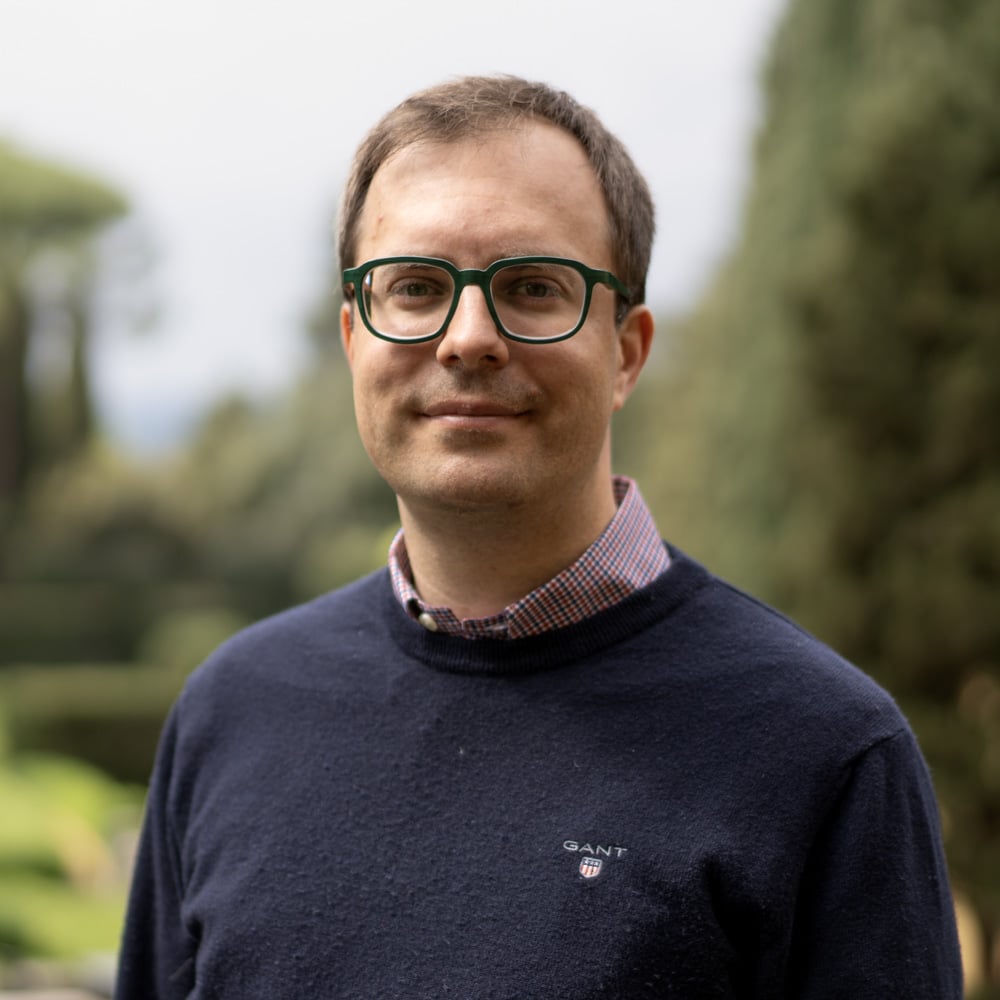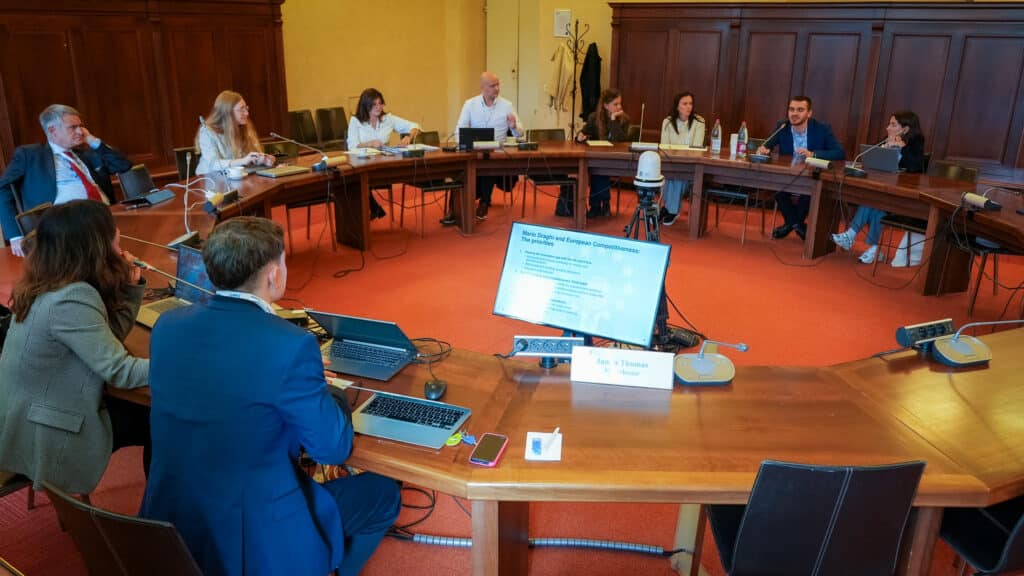An open and growing community to address the latest policy and regulatory developments
This is the fourth installment of the Topic of the Month: Research for policy impact
The FSR aims to contribute to the public good by producing relevant and impactful research, training and policy dialogue. As the topics on the policy agenda evolve, the FSR constantly needs fresh knowledge and practical expertise. Opening the door to new researchers and academics is a perfect way to fill the gaps and improve. After joining, we encourage everyone to grow and take on increasing responsibilities.
In the last year, several researchers and part-time professors have joined the FSR. In this instalment of the Topic of the Month, we interview some of those who have entered the school since 2024. Their stories reveal the different routes that can lead to the FSR and may inspire future applications: after all, we are always looking for new colleagues to join our team.
Kaisa Huhta – part-time professor
Dr Huhta is Associate Professor of European Law at the University of Eastern Finland (UEF) and a part-time professor at the FSR. She is an expert member of the Finnish Market Court as well. In the past, she consulted in the field of energy law and was a visiting researcher at the Oxford Institute of European and Comparative Law.
Hello Kaisa, you joined the FSR as a part-time professor in January 2024. Could you tell us what events or decisions brought you to the School and what activities you are currently involved in?
I had the pleasure of visiting the FSR as a research fellow in 2019 right after defending my PhD thesis. I really enjoyed the interdisciplinary atmosphere at the FSR and gradually started to collaborate more and more with people at the FSR. Among many other interesting things, this collaboration led to a book on capacity mechanisms with my fellow part-time professors Leigh Hancher and Adrien de Hauteclocque, as well as Malgorzata Sadowska. This kind of fruitful interdisciplinary collaboration eventually led me to formally join the School.
At the FSR I teach in various courses and training modules, including the Annual Training on the Regulation of Energy Utilities.
Moreover, earlier this year, we were fortunate to receive funding from the Norwegian Research Council for a study on Europe’s evolving market design towards 2040 (EVOLVE project). I will lead a work package in that project.
We heard that you were recently awarded a European Research Council Grant. Congratulations! Could you reveal to us what research you are going to perform with that funding and why it is important for society?
Yes, with pleasure. The INTEL project, for which we received the ERC grant, will develop the general doctrine of energy law in Europe. All well-established legal disciplines have some kind of doctrine, but energy law does not. A general doctrine – basically the key legal concepts, principles and theories – consolidates the foundations of a legal discipline and guides legislators, courts and lawyers in identifying, valuing and interpreting legal norms.
In light of the energy crisis and the energy transition, there is an urgent need for a general doctrine to bring coherence and predictability to energy law as a legal discipline. I’m really looking forward to the project findings. Thanks to its novel combination of methodologies, the study has potential for significant breakthroughs not only in energy law, but also in legal scholarship more broadly.
Elodie Petrozziello – Research Assistant
Ms Petrozziello is a research associate at FSR Transport since January 2024, where she supports research on transport policies. Before joining the FSR, she worked as a policy officer at the European Commission and was an intern at the Italian Ferrovie dello Stato (FS).
Hi Elodie, why did you choose to join the FSR? What aspects of the FSR did attract your attention from a professional point of view?
I wanted to join FSR for quite some time as I believe it is an ideal environment where theory and practice come together. The opportunities to learn from experienced professionals, publish academic research, and contribute to the legislative process were all chances I could not pass up.
It is now almost 10 months since you have been part of the FSR community. Could you tell us what the working environment at the FSR looks like? Did anything surprise you, either on the positive or the negative side?
Since I joined the FSR, I have had the opportunity to interact with people from various areas and I must confess that the work environment is incredibly stimulating and filled with passionate individuals. The dedication of the people around me is truly remarkable, as their knowledge and enthusiasm for their areas of expertise inspire me every day to improve and learn more. I am also amazed to work in such stunning buildings, full of historic value. I must admit that I try to work in a different villa once a week: they are too beautiful not to enjoy them all.
At FSR Transport you perform several tasks: what activity or project you were involved in has been the most rewarding or interesting for you?
I truly enjoy the scientific organization of forums and academic training courses. Participating in forums is extremely rewarding from a professional and personal standpoint. During these forums, public authorities and stakeholders discuss tangible solutions to ongoing problems. These policy dialogues are fulfilling and serve as a valuable instrument for expanding my research and thus furthering the existing academic knowledge. At the same time, training courses are equally enriching. They provide an opportunity to share my research work with both beginners and experts in the field. I believe the conversations that emerge during these activities are enlightening and unique.
Max Münchmeyer – research assistant
Dr Münchmeyer is a research associate in the FSR electricity team since January 2024. He has a PhD in Law from the European University Institute and has a long expertise in researching public policies. Before joining the FSR, he worked at the Istituto Affari Internazionali (IAI) in Italy and at the Institute of International and European Affairs (IIEA) in Ireland.
Hello Max, you defended your PhD thesis last September: in your view, what opportunities can the FSR offer to talented and motivated researchers?
I think the aspect of the FSR that really stands out for me is the interdisciplinarity of the working environment. In the ten months I have been here, I have already learned so much from exchanging ideas and working together with colleagues from different backgrounds. It has already had a strong impact on how I view my own research and its added value.
Despite being at the FSR for only a few months, you took on quite some responsibilities. Could you give an example?
I truly appreciate the opportunities at the FSR to develop and expand your knowledge and to build your research and project management skills. A particularly rewarding experience was the organisation of a dedicated online training for Ukrainian city officials, which we delivered in July 2024 as part of a collaboration with partners in Berlin and Kyiv. I feel that this experience gave me a new perspective on the implementation of EU energy and climate policies. We are now working on developing this training into one of the FSR’s online community courses.
Does the FSR have a framework in place to guide and support the broad and balanced development of researchers?
The FSR has a very transparent management style, which I think is very important in any collaborative environment. Part of that is a system of regular exchanges with my line manager about the skills and projects that I would like to develop over the coming year, using a dedicated framework that was developed with the School’s typical activities in mind. I have found this to be an important exercise, especially because it gives me occasion to reflect regularly on the kind of skills and profile, I want to build over the course of my time at the FSR.






